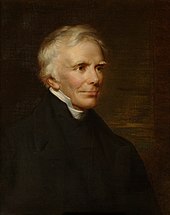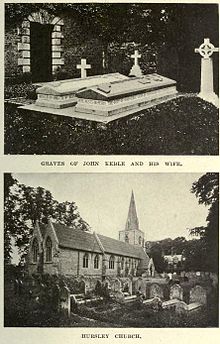John Keble
John Keble (born April 25, 1792 in Fairford , Gloucestershire , † March 29, 1866 in Bournemouth , today in the Ceremonial County of Dorset ) was an Anglican clergyman and poet of sacred songs. Keble College , Oxford was founded in 1870 as a memorial to John Keble.
Life
After studying in Oxford, Keble became a fellow at Oriel College . From 1831 to 1841 he was Professor of Poetry . In 1822 he met John Henry Newman . Another important figure in this movement was Edward Bouverie Pusey . They wrote so-called tracts that spread beyond Oxford. Keble enjoyed special respect within this group, as he was already an established poet and scholar. In addition, his sermon "National Apostasy", which he held on July 14, 1833 in Oxford, and in which he harshly criticized the state, which is increasingly distancing itself from Christianity, is considered the beginning of the so-called Oxford movement , which tried to restore the Catholic tradition to be rediscovered within the Anglican Church . In contrast to Newman, however, Keble remained loyal to the Church of England throughout his life . And not just out of convenience, but out of real conviction. He stands for the wing of the Oxford movement, which consciously saw itself as part of this church.
Keble's volume of poetry The Christian Year , published in 1827 , became one of the great classics of the 19th century. The book contains a poem for every Sunday and holiday of the church year and was very popular. It made Keble famous. There were more than a hundred editions. In 1836 he became a pastor in Hursley ( Winchester ), where he stayed until his death in 1866.
He married Charlotte Clarke on October 10, 1835, who was a helpful wife to a pastor or poet.
Works
- Christian Year 1827
- Lyra innocentium: thoughts in verse on Christian children, their ways, and their privileges 1846
- Lyra Apostolica 1836 Poems by the authors: John Henry Newman 1801–1890; John William Bowden 1798-1844; Richard Hurrell Froude 1803-1836; John Keble 1792-1866; Robert Isaac Wilberforce 1802-1857; Isaac Williams 1802-1865
- Church matters in MDCCCL Talbot collection of British pamphlets (1850)
- Letters of Spiritual Counsel and Guidance 1870
literature
- Heiko Wulfert: John Keble. In: Biographisch-Bibliographisches Kirchenlexikon (BBKL). Volume 3, Bautz, Herzberg 1992, ISBN 3-88309-035-2 , Sp. 1279-1280.
- Walter Lock: John Keble, a biography . 4th edition. Menthuen & Co., London 1893
- Correspondence of John Henry Newman with John Keble and others, 1839-1845 Edited at the Birmingham Oratory. 1917
- Plain sermons. By contributors to the “Tracts for the Times” Vol. I (new edition) Oxford 1839 Authors: John Keble 1792–1866; Thomas Keble 1793-1875; John Henry Newman 1801-1890; Sir George Prevost 1804-1893; Edward B. Pusey 1800-1882; Robert Francis Wilson
- Plain sermons. By contributors to the “Tracts for the Times” Volume X , 1839. Authors: John Keble 1792–1866; Thomas Keble 1793-1875; John Henry Newman 1801-1890; Sir George Prevost 1804-1893; Edward B. Pusey 1800-1882; Robert Francis Wilson
- Tract XC: On certain passages in the XXXIX Articles by the Rev. JH Newman 1841. With a historical Preface by Rev. EB Pusey. And Catholic Subscription to the XXXIX Articles, Considered in Reference to Tract IX by Rev. John Keble 1841 . Sold by John Henry and James Parker, Oxford 1865
- Rev. Thomas Mozley: Reminiscences: chiefly of Oriel College and the Oxford Movement . Vol. I. 2nd edition. Publisher: Longmans, Greene & Co ,. London 1882
- Rev. Thomas Mozley: Reminiscences: chiefly of Oriel College and the Oxford Movement . Vol. II, 2nd edition. Publisher: Longmans, Greene & Co ,. London 1882
- Charlotte Mary Yonge: John Keble's Parishes - A History of Hursley and Otterbourne published 1898
- Henry C. Shelley: Untrodden English ways - Chapter IV: John Keble's Hursley. Publisher: Siegle, Hill & Co., London 1910
- Literature by and about John Keble in the Internet Archive (online)
Web links
- Biography and appreciation
- Literature by and about John Keble in the catalog of the German National Library
| personal data | |
|---|---|
| SURNAME | Keble, John |
| BRIEF DESCRIPTION | Anglican clergyman and poet |
| DATE OF BIRTH | April 25, 1792 |
| PLACE OF BIRTH | Fairford |
| DATE OF DEATH | March 29, 1866 |
| Place of death | Bournemouth |



